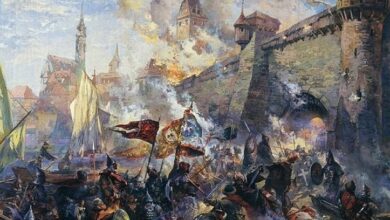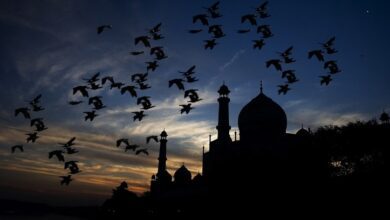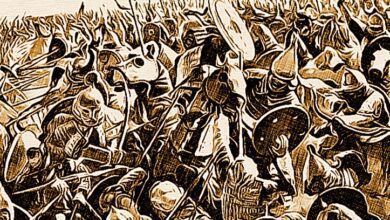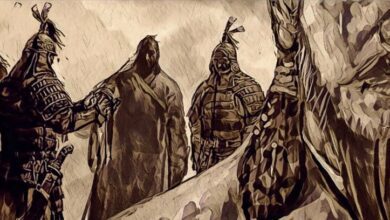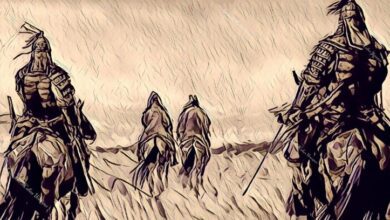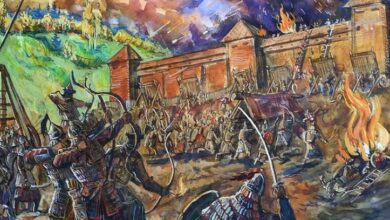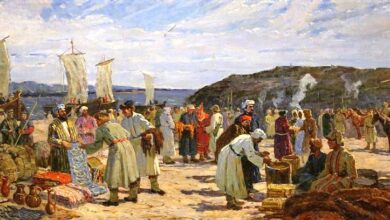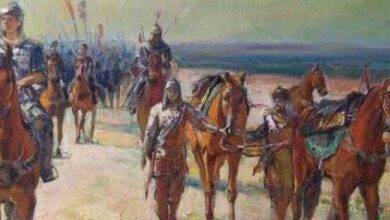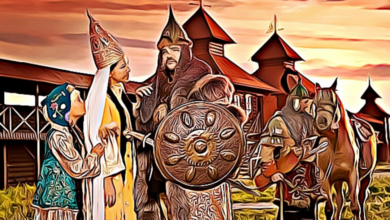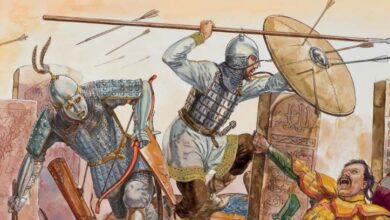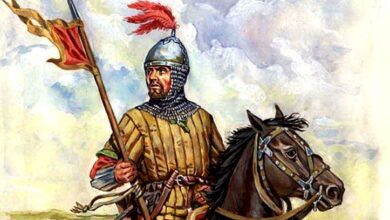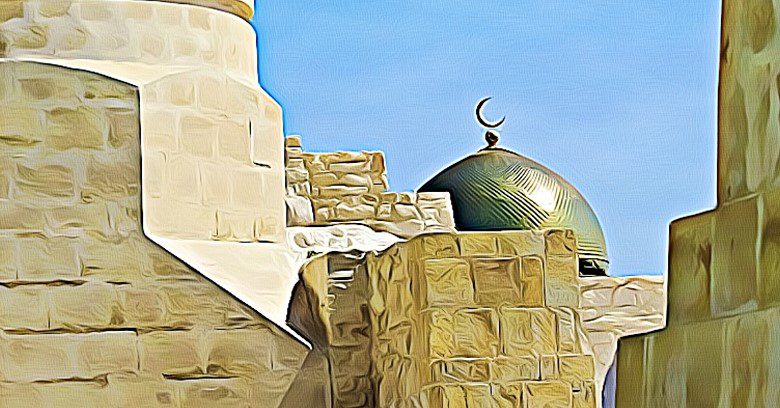
Ghazi Baraj Tarihi. Righteous path or pious deeds of the Bulgar sheikhs
AND now I want to give the information that I - thank God - was able to glean in the book of our famous sheikh Mohammed-Amin "The Righteous Path, or the Pious Deeds of the Bulgar Sheikhs", written by the Hadji in 1483, shortly before his death. Menla pays a lot of attention in his work to what escaped the eye or was insufficiently covered by Yakub ibn Nugman, Gazi-Baradj, Bu-Yurgan and bakhshi kan Sheikh-Gali Aykhum. I, as always, will retell the main thing, without stopping attention to minor details, and first of all I will list the names of the most famous sheikhs, their parents, followers and descendants ...
I will begin my summary with Sheikh Hassan, who arrived in Bolgar in 903 with the embassy of Abdallah ibn Bashtu ... Mo-hammed-Amin claims that Hasan's ancestor is Sheikh Yunus - one of the descendants of the Messenger himself, and that the Burdjans accepted from the hands of this Yunus the true faith in 737 in Djurash. And Abdallah went to Baghdad because Mikail bequeathed to send the Bulgarian embassy to the emir of Muslims in order to obtain from him the necessary blessing to the Bulgar State.
In 901, the tebir arrived in Baghdad and was warmly received by the caliph. The caliph asked Abdallah about the Bulgar State, its laws, kings and people, and was very pleased when he heard about the establishment of Islam among the descendants of the glorious Iskanderov tribe and the Khons, Kyrgyz and Bashkorts, famous for their courage and steadfastness ... The caliph promised to send a large embassy to the Kan with his letters and banner, but for now he asked to bring his messengers to Bulgar to lead the way and accomplish a feat in the war against the enemies of Islam. Abdallah, accompanied by the Caliph's servants, made the Hajj, and then went to Bulgar together with the messengers of the Muslim Emir - Sheikh Hasan ibn Jabbar ibn Yunus, the master of the Caliph's factory Masud and the merchant Musa. And this trip was made at the expense of the noble Musa, who said: “All expenses are a joy for me, for I do them for the sake of true faith, which saves in this and the next world!” […]
Almysh was unspeakably delighted by the arrival of the caliph's messengers, proclaimed Sheikh Hasan a seid and immediately ordered his son Gazan to go to Avaria and Bashta to raise Arbat and Salahbi to a holy war against the infidel Rum. Gazan set off on a journey with Abdallah, and in 904 they reached the batavyl Arbat on Sula ... Arbat replied to his father's call that he was already contributing to the fight against unfaithful raids on Burdzhan, but that he, besides this, would send to Almysh to participate in the holy war of the son of Dzhakyn ... After that, the three of them returned to Bashta, where Dzhakyn, who was afraid of the distant Bulgar, wanted to stay, especially since Salakhbi, pleased with his intention, offered him both the court of his grandfather and help in returning the Kara- Bulgarian throne. Abdallah was against this, but Ghazan, who saw Jakyn as just another rival in the future struggle for the throne, supported his nephew and left him in Bashtu with his power. Having agreed with Salahbi on a joint action against Rum in 905, the ambassadors set off for their homeland through the Bashtuy Karadzhar, but here they were unexpectedly met by the Kara-Bulgar biy Ryshtau. Having richly endowed the ambassadors, he ordered to convey to the cana that in this war the Kaubuians would not take the side of Khazaria and, in case of danger, would protect Bashta ...
In 905, the Burtases, together with the Cumans, attacked the Bulgars and, although they were defeated and paid for their insolence, they nevertheless diverted the forces of the State from the Rumian borders. At the same time, the malicious son of As-Khalib Khud made his way along the Idel to Jir and, having recruited people here to his gang, went to Galidj and took possession of it. However, Salahbi still saved the honor of the Power and made a successful attack on Rum. Thanks to the valor of the Anchians, unprecedented booty and so many captive Rumians, Gurdjians and Almanians were taken that Salahbi populated with them a whole quarter of his capital. The brave biy sent a part of the booty of the Rum as tribute to the Djir, Bashtu and Karadzhar tributes. It was brought by Balus, the Anchi head Jun and his son Barys, and there were Rum fabrics, Chin silks, Farang utensils, Alman swords, carpets from the Gurdjian region Aryak and many other marvelous things in it. Kan ordered to send half of these riches as a gift to the Caliph as proof of success in the holy war. In 906, Musa and the seid's servant went with them to Baghdad. This servant turned out to be a malicious person, and I will not name him so that he will not even remain in my memory. Envying his master, he decided to harm him and on the way persuaded one of the biys of Salar to attack the royal caravan. He gave free rein to his cunning - killed and robbed
190
noble Musu, after which he migrated with the taken to the borders of Khorezm. And the servant made his way to Baghdad and informed the caliph about the refusal of Al-mysh from the true faith and from going to the holy war, and even about the murder of the caliph's messengers by the Kan. There was no one to refute this monstrous lie, so it made an impression on the Caliph and forced him to refuse to send the Great Embassy to the Kan ...
In 911, Abdallah again arrived in Baghdad to the throne of the ruler of the faithful and made the caliph send the Great Embassy to the Bulgars. But when in 912 the embassy reached Bukhara, the thunderous news came about the attack of the Uruses on the Muslims of Azerbaijan and Persia. It turned out that it was Hood with his Sadums and Balyns who started the war with the State. In 911, he suddenly appeared at Bashtu. The Bashtuy Balyns, dissatisfied with the domination of the Anchs in Rus', treacherously opened the gates to the enemy in the morning and, together with the Galidjians who entered the city, rushed at the Sadumians of Salakhbi and the Anchians of Barys. Salahbi managed to break out of the city and go to Jir through Karadzhar, and Barys, who covered his retreat, was captured. Both Lachyn's son Ugyr and Jakyn, taken by surprise, were in the hands of Hud. The Khazar bek Arslan immediately offered Hud to raid Bulgar and Garabstan in retaliation for their alliance against Khazaria, and for this he promised to leave Bashta behind him and take a small tribute from him for the possession of Russia. Hud himself was looking for a pretext for war with the State, for he sought to tear Jir away from her and was afraid of her alliance with his sworn enemy Salahbi. Together with his Galidjians, he suddenly attacked the Bulgar at the moment when the Burtases and Cumans laid siege to Mukhsha and Burtas-Suvar, and the Turkmens of Salar moved towards the city of Sulcha, which was called Seljuk. There was an agreement between the Khan and Almysh on the marriage of their children, which was confirmed after the birth of the Kan from his wife - Saklanka - the daughter of Zukhra, and the Salar - the son of Takhir. But when the khan refused Jafar's offer to organize a joint campaign against Itil in retaliation for the expulsion of Salahbi from Bashtu, the imperious and tough Kan announced his desire to marry Zuhra to Askal and, in turn, pissed off Salar. Having learned about this, the old instigator Arslan offered Salar to organize a joint attack on the Bulgar, and the khan went for it. A horde of Turkmens laid siege to Sulcha, locking up in the city of Askala and the children of Almysh, his bride Zukhra and Shahzade Mala, who had come to him.
Ghazan, sent by the Kan to rescue the city, preferred to return without joining the battle. Then he portrayed the case as if he rushed back, having received false news about the attack of Hud on the Bulgar. In reality, Hood went on a raid on Islamic areas
191
Bulgar Sea and took rich booty there. And Salar, meanwhile, took Sulcha and captured Zuhra and Mal. Askal managed to escape through the gate, the storming of which was entrusted to the Khazar allies of the Turkmens. The sons of Bakchuar, the elder Alan and the younger Yusuf, who led the Khazars, did not move, and after the robbery of Sulci, they expressed a desire to stay to protect the city and protect the crowd. Salar willingly left his allies who were hampering him and moved to Bol-gar with his sons Alpamysh and Takhir. The Turkmens softened after the first success and therefore moved carelessly and in discordant crowds. It was said that Almysh was preparing for the worst when the right wing of the Oguzes was suddenly attacked from behind the forest by the Bershud militia of the son of Bel-Yumart Byrak. This was in the mind of Bolgar, and Julut, who was next to the Kan, immediately hit the Turkmens from the city in the forehead. When the slaughter began, Byrak immediately jumped back from the Oghuz to the forest and began to shoot them with arrows. Not knowing what to grab onto - swords or bows and shocked by the misfortune that suddenly fell on their heads, the Turkmens lost all their victorious ardor and soon turned into a stampede ...
Having galloped to Sulci, Salar and his sons experienced a new shock: the Khazars were no longer here. It turns out that in their absence, Mardzhan crossed from the Arbugin side to the Bulgarian side and attacked the infidels. The Khazars immediately took to flight. The cunning Yusuf managed to get to Itil in full, but Alan was captured ...
Salar then left his son Alpamysh to cover the retreat, and he himself quickly went to the steppe. When Byrak and Dzhulut approached Sulcha, Alpamysh grappled with them, but fought sluggishly and was soon taken prisoner.
Far away in the steppe, the khan and his son came to their senses. Tahir remembered the loss of the beautiful Zuhra, with whom he was madly in love, and howled in despair...
The caliph, having learned about the defeat of Islamic regions by Hud, became very upset, accused Almysh of negligence in protecting the possessions of Muslims and returned the Great Embassy. Abdullah had to travel home alone. He did not dare to go through the hostile Khorasan and Turkistan and went by ship through the Bulgar Dingeze to the mouth of the Dzhaik. From here, he moved along the river to the nomad camps of the Bulgar Badjanaks, but came across a Khazar patrol looking for Alan, and was taken prisoner by him.
Salar demanded from Arslan the extradition of Zukhra and Mal, taken by the Turkmens, but the bek, seeing the weakening of the Oguzes, flatly refused to do this, under the pretext of the need to return the children to their father. True, in order to calm the khan, Arslan accused the kidnapper full of Yusuf of
192
theft of Zuhra and threw him into the zindan. However, this did not satisfy the khan, and he and his son suddenly attacked Itil at the moment of returning to the city from the Khud raid. Caught between Khazars and Oghuz fighting with each other, the Galidjians began to beat both of them. Takhir managed to break through to the Khakan's palace, and the bek considered it good to give him Zuhra. The happy young man began to cross the Idel with his bride, but was surrounded by the Galidjians. Those, on the orders of Hud, killed him, and Zuhra was captured and attached to 40 captive Muslim women captured by them in a raid. Salar in a rage attacked the Galidjians, and they, escaping, sailed up the Idel. Hud wanted to go to Djir and capture this city, but at Bolgar the Salahbi fleet blocked his path. Of all the ships of the Galidjians, only three with 40 slaves and Zuhra managed to break through to the Djir. There, they were joined by several Sadumians of Salahbi, who persuaded them to sail with the captured gold and stock to Sadum and sell beautiful girls there at a great profit. The robbers decided to go to Sadum along the Aikhi-yuly (“Aikhi Road”), which began within the State and went through the entire Biysu province to the mouth of the Biysu River, where the Aikhi-Kala balik was, and from it along the Kuk dingez sea, which was part of Sea of Ak dingez, to the island of Sadum. And navigation on this sea was very difficult, because for most of the year it was shackled by ice, from which the Urts living on the coast made walls for their yurts and fences. Only one month it was relatively warm here, and then the walls of ice melted, and the Urts remained in yurts, and the sea was freed from ice. This path and the city were founded by a descendant of the merchant Tuyma - Aikhi, which is why they got his name. And it happened like this. One day, Aikhi was in Jira on business and met with Salahbi's father, Erek. Erek noted with regret that the merchant had brought excellent goods, but he could not take them to Sadum and Alman because the Galidjians blocked the way to Artan Dingeza. Then Aikhi said that there was a sea in Biysu and one could try to get to Sadum using it. Then Erek took about 150 of his soldiers and went with them to the river Biy-su. There they prepared a tree, from which they made ships in the spring and went to sea in the summer. They got to Sadum and then returned the same way, making it permanent. And the way from Idel to Biysu and further to Sadum was very difficult and dangerous. So, if the merchant reached Sadum, he did not have time to return back in the same year, because the ice covered the sea. He was waiting for the next summer to sail again on ships from Sadum to Biysu. In addition, the robbers lay in wait for brave travelers everywhere and even attacked Biysa. But the proceeds from the Bulgar goods in Sadum and the Farang goods in the Bulgar were so great that they more than covered the travel expenses.
193
costs and forced again and again to embark on this dangerous journey. Bek Saduma Tarvil cordially met Aikhi and issued a law, according to which the Bulgarian merchants received the right of duty-free trade in his possessions. Both his son Khakan and his other descendants were very disposed towards the Bulgar merchants. And this trade was interrupted after the damned Kypchak Khan Mankai-Timer captured the northern regions of the State and transferred them under the control of the Seber Bashkak. The same allowed the Galidjians to rob the Bulgar merchants in the north of Biysu and Ur with impunity and made safe trade there impossible. When, after the death of Aksak-Timer, ours threw the Galidjian robbers out of the northern regions, it was no longer possible to resume trips to Sadum, because the Galidjians managed to create a strong fleet during the atrocities of Mankai and intercepted all the ships in a row. But in the time we are describing, everything was different and no one interfered with the Sadumians at sea, except that they each other ... The robbers found one of the people of Aikhi and persuaded him for a lot of money to take them to Aikhi-Kala ... In the harbor they saw three ships and, having plunged on them, sailed to Sadum. But a storm broke out in the sea, and all the ships with captives and gold were thrown onto Chulman Island. From the wreckage of the ships, the robbers made one ship, which, however, could only take part of the people. When the robbers began to decide who should sail, they quarreled among themselves and rushed at each other with swords. Many of them fell in this battle, and the survivors were killed by captives who hated the Galidjians for the murder of their relatives and friends. Several robbers hid on the ship, but the girls burned it with them. After that, the captives began to host on the island and chose Zuhra as their queen.
And on Chulman there was a mountain in the cave of which Alp Baran lived. The Almighty revived him and ordered him to punish people for debauchery. Since then, the Baran, in the guise of a giant with a naked body of a man and a ram's head, wandered the Earth and with the look of his huge eyes made the males die, and the sinners - to throw out the fruit ... Ours called him Kuk-Teke and said that he often appears from the bottom of the river, for The Almighty allowed him to walk under water in order to hide his nakedness from the righteous laity.
The Almighty did not allow Baran to get close to women for a long time, but when there were captives on his island, he heeded the entreaties of Kuk-Teke and allowed the Alp to marry them. However, Zuhra remained a girl, and the Almighty raised her to heaven.
The rest of the captives from their children left only girls to live, for such was the will of Kuk-Teke. Therefore, only women lived on this island. If men tried to land on Chulman, then the islanders killed them ...
194
And on this island there were several caves, from which, at a certain time, underground fire escaped. Tongues of flame joined together, threatening to burn all life. But at that moment, Alp-bika Chak-Chak always flew to the island and covered the women from the fire with her wings. Therefore, they say, Chak-Chak carried eggs that could melt ice. These eggs are collected by people in different places and sold to travelers who swim in the Chulman Sea. When the ice blocks the way for their ships, they throw these eggs on them, and they melt them ...
And I got this news from the book of Menla Abdallah, the son of Mi-kail Bashtu, so that the reader could get an idea of the writing style of this famous sheikh. He made many trips, and the last of them was undertaken by him together with the emir Yalkau Baltavar in 925-930 to the holy places of Islam. Then the caliph of Baghdad accepted them and blessed Yalkau to occupy the Bulgarian throne...
The son of Abdallah was Mamli, his son was the teacher of Kan Mae-gut tebir Masgut, his son was Shahidulla, his son was Salman, married to the daughter of a merchant from Azerbaijan Samad, his son was Samad, his son was Khusain, his son was Gali, his son - Mulla Tekliman, who traveled with Abu Hamid Garnati to Batavyl and Rum. On the way back, Takliman stopped at Bashta. Together with him, the Rum merchant Uraz, the son of Urum-Alp, the grandson of Türkmen, and the Bashtu master Sukhrab, the son of Saklan, arrived in Bulgar. They laid the foundation for the noble Bulgar Suvarchi clans. In addition, Tekliman went as an ambassador to the Oimeks, who called him Tyumen. The place where the negotiations were going on, then they began to call his name - Tyumen.
The son of Teklimen was Mamli, married to the daughter of the merchant Uraz Emryach, his son was Uraz, his son was Gusman, whose daughter was married to the merchant Khusain, his son was Altynbu, who was a devoted vizier of Altynbek and named himself after the Kan. And Altynbu had a daughter, Suz, and a son, Gusman. Gusman had a son Gaisha, he had a son Mohammed, he had a son Saman, who led the resettlement of people from the Bulyar side to the Kazan side, he had a son Khusain, he had a son Nur-Daulet, he had a son Bahadir ...
I will also say about the clans that were closely related to the Bashtu clan. The son of the merchant Uraz was Gazan, his son was Teklimen, his son was Gali, his son was Urum-Mohammed, his son was Ismail, his son was Urum-Mohammed, his sons were Kurmysh and Salar, married to the daughter of the Seber Bek Bulyartai. And Bulyartai was the uncle of Bek Tagyl, the vizier of the Sarai khans and the father of Bek Bulat-Timer. Salar's sons were the pious Sheikh Sayf Sarai and Salih. Salih had a son, Urum-Mohammed, he had a son, Hamza, and a daughter, Fatima. Khamza had a son, Salma, and he had a son, Salih, who owned the largest tavern in Kazan...
195
Sukhrab had a son, As; he had a son, Mamli; Aihi-bike. And Asyl-Gali came from the clan of the Banji merchant Burtas, whose descendant was the merchant Suvar. And the son of Suvar was Asyl, who moved to Kamysh and received the nickname Kamysh-Asyl, his son was Aslan, his son was Asyl-Gali, his son was Bulat ...
And the son of Moskhi was As, his son was Rail, married to the daughter of Urum-Mohammed Fatima, his son was Urum-Mohammed, who burned down in Kazan during the attack of the Uruses on the outer baliks of the city, his son was Mamli-Bulat ...
And another famous merchant family of the Bolgar was founded by the merchant Masud, who arrived in the State together with the tebir Abdallah. Masud's son was Bashir, his son was Musa, married to the daughter of the merchant Urum-Atrak, his son was Atrak, his son was Bashir, married to the daughter of Bek Mohammed from the Alabuga family Baryn ... Julut was the son of Alabuga, his son was Tatra-Mohammed, the first Ulugbek of the province of Tamta, and his son is Julut, the father of Bek Mohammed. Bashir's son was Julut, his son Hammad, his son Ahmed, his son Abu Bakr, his son Appak, his son Dair, his son...
And here are the names of seids, sheikhs and kazys from the clan of Ahmed ibn Fadlan, who was a descendant of ...
The son of Ahmed ibn Fadlan was Nasyr, his son was Mohammed, his son was Hamid, his son was Nugman, his sons were Sheikh Daud and Kazy Yakub. Sheikh Daud dared to express dissatisfaction on the occasion of the expulsion of Amir Ahad Moskhi by Kan Adam, and for this he was expelled from Echke Bulgar to the province of Saksin, where his son Suleiman was born in the city of Saksin-Bolgar. Under Emir Kolyn, Suleiman was returned to Bulyar and became a seid. The highest minaret of the mosque "Baradj" was named after him. And the son of Suleiman was Sada, who was appointed seid after the suppression of the uprising of Mamli-Omar-ra, his son was Kylych, who wrote the well-known dastan about Takhir and Zuhr and was also a seid ...
And the son of Kazy Yakub was Saint Isbel, who consecrated the foundation of the city of Kazan with his prayer in 1103, his son was Sheikh Kul-Daud, his son was Mirkhuja Nakkar, his son was Mohammed-Gali, his son was Mir-Gali, his son was Yadkar, his son is Rajap, his son is Isbel Khuja, who died in 1359, his sons are Hammad and Khusain. Hammad, at the age of 93, was forced to flee from Bolgar to Chirmyshan when Ide-gay burst in there. The sons of this pious sheikh all died as martyrs in Ulug-Bolgar, defending his shrines from the Mongyt desecration. His brother Khusain, after the death of his beloved wife, retired in sorrow to Bashkort and rested there near Mount Mamlityuba in 1393 at the age of 83, leaving no children behind. Since Hammad remained completely alone, he blessed Ashraf, the son of Emir Challa-Mohammed, to accept the title of seid in order to return to Bulgar its proper power...

